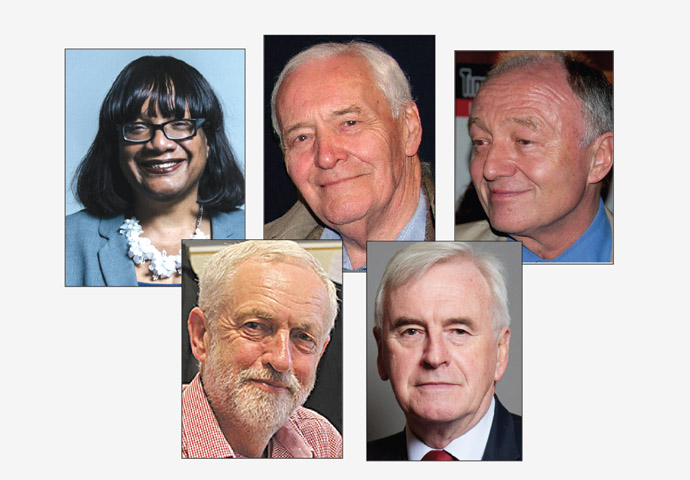The Searchers by Andy Beckett – a compelling assessment of five key figures on the Labour left
Thursday, 20th June 2024 — By George Binette

Clockwise from top: Diane Abbott [Chris McAndrew], Tony Benn [Isujosh], Ken Livingstone, John McDonnell [Roger Harris] and Jeremy Corbyn
“IN Britain, as elsewhere, the left has had few electoral successes and many failures. People on the right, as well as journalists, and voters… have long wondered: why doesn’t the left just give up?”
So writes Guardian columnist Andy Beckett in his extended consideration of the lengthy political careers of five key figures on the Labour left: Diane Abbott, Tony Benn, Jeremy Corbyn, Ken Livingstone and John McDonnell.
In some 500 pages of straightforward, unadorned prose without footnotes, Beckett attempts to use the five’s trajectories since the 1970s as a prism for viewing nearly five decades of British political history. He draws on sometimes illuminating interviews with his four surviving subjects.
The author’s approach certainly makes for an accessible, frequently compelling read, albeit at an occasional cost in terms of ideological nuance.
Tony Benn was something of a living bridge between the Bevanite left of the 1950s (of which he was never really part) and a post-1968 generation of political activists.
Benn, the patrician politician who successfully renounced an aristocratic title, has been dead for more than a decade, though his eloquent advocacy of a radical reformism still inspires younger generations and haunts surviving figures on Labour’s right, not least Tony Blair, who revealed an envious admiration for Benn’s oratorical powers.
As for the other four, Livingstone, can no longer participate politically due to Alzheimer’s disease. After a bitter battle to regain admission to the Parliamentary Labour Party (PLP) during a 13-month suspension, Diane Abbott will surely retain her seat as MP for Hackney North & Stoke Newington, while one-time Camden Council policy chief, John McDonnell, will almost certainly win re-election in the Hayes & Harlington constituency, having trod a fine line between alienating hard left supporters and incurring the wrath of the party’s central machine since 2020.
And then there is Labour’s improbable former leader, Jeremy Corbyn, who had the closest personal relationship with Benn through the 1980s and 90s. Cast out of the PLP in October 2020, he now finds himself standing as an independent in the Islington North constituency he has represented for 40 years and expelled from a party he joined in the mid-1960s.
Beckett’s assessments of his central protagonists are hardly hagiographic, but he displays broad sympathy with their sometimes disparate, sometimes unified attempts to forge a viable politics significantly to the left of mainstream Labourism and frequently in sharp conflict with party leaderships.
Despite considerable overlap chronologically and their shared experience as hate figures for right-wing media, the common denominators between the four aren’t always self-evident.
All four have, however, shared a commitment to extra-parliamentary activism, sustaining an identification with class-based politics, but one informed by engagement with movements against social oppression in Britain and opposition to imperialism internationally.
Following the July 4 general election three of the surviving quartet may be on the backbenches, doubtless still of interest to the media, but consigned to the margins in the event of a Starmer-led Labour government with the sort of overwhelming Commons majority that opinion polls currently indicate.
So, have their decades in politics achieved next to nothing beyond status as historical footnotes?
Beckett rejects this view, contending convincingly that the cumulative legacy of the post-1968 Labour left, particularly the GLC’s, has helped create a society that is far more socially liberal than the Britain into which Abbott, Corbyn and McDonnell were born.
Though their contributions cannot be quantified, they are nonetheless real and even as culture wars burn with renewed intensity the supposedly “loony” left of the 1980s helped secure enduring gains for minority ethnic groups, LGBT people and indeed women.
Even so, Beckett’s standard bearers of the Labour left have proved unable to “bring about a fundamental and irreversible shift in the balance of power and wealth in favour of working people” heralded in Labour’s February 1974 election manifesto. In fact, Britain is more unequal in terms of wealth and income distribution than 50 years ago when Benn sat at the head of government ministries.
Corbyn recounted to the author a 2001 encounter with a 75-year-old Benn, who came upon Corbyn and McDonnell in a Commons dining room. An excited Benn, when asked by Corbyn whether he was OK, replied: “Ah, yes, yes. I’ve just had a death threat. I’m still relevant!”
The amusing anecdote also highlights the extraordinary level of verbal and written abuse all five of Beckett’s subjects have endured, attesting to the influence of a virulently hostile right-wing press and more recently social media.
And even the more liberal sections of mainstream media, such as the Guardian, have rarely given the Labour left a free pass and often treated it, especially during the years of Corbyn’s leadership, as suspect and worthy of scorn.
Of course, the media, however powerful, is hardly omnipotent. Understanding the left’s failure requires serious consideration of the crucial combination of individuals’ subjective shortcomings and the structural obstacles to more fundamental transformation of a capitalist society with enduring feudal trappings. Beckett hints at this but shies away from such an analysis.
In the book’s introduction, Beckett proclaims: “Another Politics Is Possible,” a seeming echo of a slogan from Corbyn’s initial 2015 campaign for the Labour leadership.
Given the party’s rightward gallop under the Starmer leadership, this may seem a forlorn hope, but Beckett’s concluding chapter suggests that even now Labour may be “drawing on the thinking which went on during McDonnell’s shadow chancellorship”.
We may soon learn whether a break with Britain’s neoliberal consensus will somehow trump the current leadership’s authoritarian tendencies, determination to adhere to US foreign policy and apparent embrace of Tory-imposed spending limits.

• The Searchers: Five Rebels, Their Dream of a Different Britain and Their Many Enemies.
By Andy Beckett, Allen Lane, £30